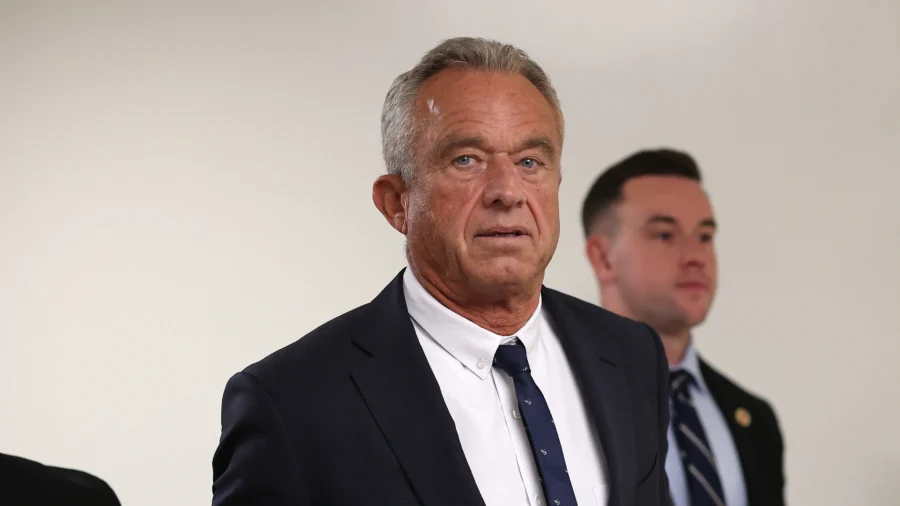While Robert F. Kennedy Jr. continued his tour of Capitol Hill in a quest to gain backing from lawmakers, a group of Republican senators launched a new caucus to support the objectives of President-elect Donald Trump and his pick to head the Department of Health and Human Services (HHS).
The Congressional Make America Healthy Again (MAHA) caucus was formed to cultivate partnerships with officials at the local, state, and federal levels who are interested in MAHA initiatives.
Other objectives include establishing educational campaigns to promote nutritional awareness and healthier lifestyles, addressing chronic diseases, and increasing access to affordable, nutrition-rich foods.
Sens. Roger Marshall (R-Kan.), Rick Scott (R-Fla.), Ron Johnson (R-Wis.), Tommy Tuberville (R-Ala.), and Cynthia Lummis (R-Wyo.) are the founding members.
“The MAHA caucus is committed to improving health outcomes by prioritizing nutrition, providing access to affordable, nutrient-dense foods, and focusing on primary care availability to tackle the root causes of chronic diseases,” Marshall said in a Dec. 19 statement.
Marshall is a former physician who practiced medicine for 25 years, according to the press release.
He said the caucus will promote a “Food is Medicine” approach and “foster transparency, innovation, and a transformative agenda that builds a healthier, stronger nation.”
After running for president as a Democrat and then an independent, Kennedy suspended his campaign in August, endorsed Trump, and formed the “Make America Healthy Again” campaign.
The environmental lawyer and Children’s Health Defense founder was nominated by Trump to serve as HHS secretary last month and immediately promised significant changes throughout the department.
Multiple Republican senators have expressed agreement with Kennedy on issues such as ending what the latter described as corporate capture of health agencies and removing chemicals from the U.S. food supply.
The HHS manages 13 agencies, including the Centers for Disease Control and Prevention (CDC), the Food and Drug Administration (FDA), and the National Institutes of Health (NIH).
Fighting chronic disease, improving children’s health, and addressing corporate influence on government agencies were vital parts of Kennedy’s campaign platform when he ran for president as a Democrat and then an independent.
Kennedy will appear at confirmation hearings in January with the Senate Finance Committee, which oversees the HHS and is scheduled to be led by Sen. Mike Crapo (R-Idaho).
If Kennedy is approved by that panel, the full Senate will vote on his nomination.

When the new Senate meets in January, Republicans will hold 53 seats compared to 47 for the Democrats.
After announcing the creation of the MAHA caucus, Marshall said he would vote to confirm Kennedy.
Since Monday, Kennedy has made the rounds on Capitol Hill, visiting with Republican senators and providing insight about his views.
He has repeatedly said little will change until the influence of giant or private corporations on the FDA, the CDC, and the Department of Agriculture is addressed.
At a roundtable organized by Sen. Ron Johnson (R-Wis.) in September, Kennedy said these agencies “advance the mercantile and commercial interests of the pharmaceutical industry that has transformed them and the food industry into sock puppets for the industry they’re supposed to regulate.”
His comments about potential changes within agencies under the HHS have drawn praise from Republican lawmakers and MAHA advocates and criticism from Democrats and public health officials.
“FDA’s war on public health is about to end,” Kennedy wrote on X on Oct. 25, adding his support for raw milk, ivermectin, hydroxychloroquine, foods with healing properties, and natural remedies such as sunshine.
Kennedy told The Epoch Times in September that he would revamp the NIH to focus on the causes of autism, autoimmune diseases, and neurodevelopment diseases instead of developing drugs and serving as an incubator for pharmaceutical products.
He has also vowed to lead efforts to remove chemicals in ultra-processed foods.
Multiple times this year, Kennedy has called for a review of advertising rules for pharmaceutical companies and has urged Trump to ban pharmaceutical advertising on TV. He also believes in eliminating liability protections for drug companies.
As for vaccines, he has advocated for safety and informed consent.
“I’ve never been anti-vaccine. People should have choice, and that choice should be informed by the best information possible,” he said. “I’m going to ensure that there are science-based safety studies available and people can make their own assessments about whether a vaccine is good for them.”

On Dec. 17, Lummis told The Epoch Times that she was interested in exploring Kennedy’s ideas and thoughts about addressing chemicals in foods.
She added that she is not concerned about his views on vaccines.
“He wants to be sure that information about them is transparent so people can make up their own minds. He’s not trying to stop other people from having vaccines,” Lummis said. “I’m very comfortable with his position on vaccines.”
In the Dec. 19 statement announcing the debut of the MAHA caucus, Lummis said that the group would work to improve the health of Americans and “hold the federal agencies who have failed the American people accountable.”
Scott, who is the incoming chairman of the Senate Special Committee on Aging, voiced his support for Kennedy in the same statement.
“From the day we are born, we start aging—and my goal is that every American has the resources and information to live long, happy lives,” Scott said.
“If you have your health, you have everything and I am looking forward to working with my fellow MAHA members and RFK Jr. to Make America Healthy Again.”
Kennedy is expected to meet with more senators on Dec. 20.
From The Epoch Times

